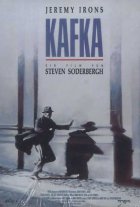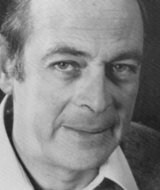
Kafka Page #5
- PG-13
- Year:
- 1991
- 98 min
- 697 Views
LUDWIG:
(shaking hands)
Ludwig.
OSKAR:
(now it's his turn)
Oskar.
KAFKA:
You look like brothers.
ASSISTANTS:
Yes -- we do.
KAFKA:
Have you worked here long?
ASSISTANTS:
No, no, no -- quite a long time,
yes.
Kafka doesn't quite know what to make of these two, but they
seem pleasant enough fellows and they're looking at him with
such wide-eyed innocence he doesn't know what more to say to
them. So he turns to look around the new area he's been
assigned -- a burrow all to himself now -- even a personal
clothes peg on the wall for his coat.
The Assistants make stupid faces at each other behind his
back, but look serious again when he turns around.
KAFKA:
Well, we'd better move things
from my old desk.
ASSISTANTS:
Look at each other with identical frowns, then back at
Kafka. Oskar nods, as if to say "oh, all right, if we
must." And Ludwig grins.
CUT:
Kafka types up forms. He hears some noise and glances over
his shoulder to see how the Assistants are getting on --
they're sharing another desk, facing each other, and seem to
be working quietly, though with pouting expressions.
Kafka rolls a new form into the typewriter -- when a shadow
falls over the page.
GABRIELA:
Eduard and I had lunch together
one day ... and you saw us.
Kafka looks up at her. He nods.
KAFKA:
On the Embankment.
CUT:
THE EMBANKMENT - MIDDAY
Kafka and Gabriela stroll by the River, Kafka finishing off
his lunch as they go, occasionally offering tidbits to
Gabriela who either samples or refuses them.
GABRIELA:
Eduard.
(notes Kafka's reaction)
He didn't tell you?
KAFKA:
No.
GABRIELA:
He would have. You were his best
friend. A better friend than me.
KAFKA:
I suspected that he -- well.
GABRIELA:
What?
KAFKA:
That he was -- satisfied in that
regard. I didn't want to pry.
GABRIELA:
(throws her hair
back proudly)
It's not that we wanted to deceive
anyone -- but you know how these
things are looked upon at the office.
Kafka lets out a smile at that. Gabriela is suspicious of
smiles.
GABRIELA:
What's funny?
KAFKA:
This morning it was suggested to
me that my own sense of office
fellowship could bear improving.
GABRIELA:
As long as it's on their terms.
If your work and your private
life don't correspond to their
specifications you're labelled a
dangerous agitator -- with no
recourse whatsoever.
The gnarled, barren branches of a nearby tree shiver over the
two of them.
KAFKA:
How long were you and Eduard --
GABRIELA:
Two or three months, that's all.
(adds)
-- I seduced him.
HIGH TERRACE:
A flight of stone steps takes them up here to this vantage
spot overlooking the River and the city beyond. Kafka stands
by a railing -- and the huge, distorted shadow of SOMEONE
looms suddenly on the high wall under him.
GABRIELA:
You know as well as I do that he
didn't commit suicide.
Kafka looks at her.
KAFKA:
No, I don't. I'm amazed that anyone
is able to bear life with any
assurance at all.
GABRIELA:
Eduard didn't see it as something
that needed bearing.
KAFKA:
difference, wouldn't they?
GABRIELA:
Do you think people in the New
Town care what happens over here?
(nodding across the
water)
This will always be the ghetto.
KAFKA:
He wasn't robbed. He was
identified by his wallet.
GABRIELA:
And you believe everything the
authorities tell you.
KAFKA:
When I have no reason to doubt.
GABRIELA:
The very fact that they're
authorities should give you reason.
People will do anything to protect
their own interests. For all you
know he was killed at the hands of
the police.
KAFKA:
-- What could he have done to
warrant that?
For a moment she seems about to tell him, but then looks
IN THE DISTANCE:
Someone else has paused at the embankment wall further away
to stare at the roiling water. He's too far away to see
clearly. Probably nothing sinister about him at all.
Still ...
GABRIELA:
Turns back to Kafka.
GABRIELA:
Are you free tonight?
KAFKA:
Tonight?
GABRIELA:
There are some people I'd like you
to meet. Can you come to the
Musil district at eight o'clock?
KAFKA:
... All right.
Her eyes lock on his for a moment. She's beautiful. He's
fearful.
GABRIELA:
didn't you?
KAFKA:
Last year. I -- it was broken
off.
GABRIELA:
KAFKA:
And you ...?
GABRIELA:
I'm suspicious of men who want
to marry. I believe they think
it's the only thing that will
make them equal to their fathers.
THE SHADOW ON THE WALL BENEATH
Disappears, the ominous black mass flowing off the large flat
surface as abruptly as it arrived. While up there on the
terrace we see Gabriela walk away from Kafka.
KAFKA:
Stays where he is a moment, watching her. He may have found
his ideal woman.
KAFKA:
(then follows
behind her)
-- I don't know the Musil
district.
GABRIELA:
(without turning)
You won't have any trouble finding
it.
CUT:
FAT MEN - NIGHT
Sit laughing, jowls gyrating, around a table filled with an
abnormal amount of food. One of them stops laughing then,
and the others follow suit, one after the other in turn,
until they're all silent, looking at the same thing.
We're in a fancy restaurant, and the other customers have
also turned away from their dinners for the moment to stare
at the Man in Black who stands before the Fat Men.
The man wears a black mask as well. He presents the Fat Men
with a covered tray. They look at it, then back at him --
but he's walked away. They look at the tray again -- and one
of them lifts the cover. Underneath lies the classic black
bowling ball -- with a fuse burning at the top. The Fat Men
all try to stand up at once but --
BOOM! Their booth explodes with them in it.
At the doorway, holding a revolver loosely in one hand to
discourage heroes, the Man in Black turns calmly to face the
stunned restaurant.
MAN IN BLACK:
(hoarse voice)
Long live anarchy!
He leaves. Fire in his wake.
CUT:
Kafka walks the crooked streets -- in the direction of the
plume of smoke and illumination coming from the burning
restaurant.
In the dark distance behind him there seems to be a person
following him.
NOISY BEER SHOP:
Neighborhood denizens have come out, hearing all the
excitement not far away. Kafka walks past. He looks behind
him, but the following figure has gone.
TWISTED LITTLE STREET
Kafka comes around a curve -- and sees ahead a dark figure
a black cape standing waiting under a lone lamppost. When
Kafka gets a bit nearer, the figure starts to walk slowly
away, as if expecting Kafka to follow.
DIRTY YARD:
The dark figure walks alongside a row of black window panes,
turning around the corner where they end. Kafka follows
around the corner -- and through a dingy doorway.
A LOPSIDED STAIRWAY
Leads him up to a large attic. Warning shadows.
ATTIC:
Gloomy except for the light around a table at a far end.
Kafka advances, seeing Gabriela sitting there with her same
companions from the coffee house. Kafka stops in front of
the table.
Translation
Translate and read this script in other languages:
Select another language:
- - Select -
- 简体中文 (Chinese - Simplified)
- 繁體中文 (Chinese - Traditional)
- Español (Spanish)
- Esperanto (Esperanto)
- 日本語 (Japanese)
- Português (Portuguese)
- Deutsch (German)
- العربية (Arabic)
- Français (French)
- Русский (Russian)
- ಕನ್ನಡ (Kannada)
- 한국어 (Korean)
- עברית (Hebrew)
- Gaeilge (Irish)
- Українська (Ukrainian)
- اردو (Urdu)
- Magyar (Hungarian)
- मानक हिन्दी (Hindi)
- Indonesia (Indonesian)
- Italiano (Italian)
- தமிழ் (Tamil)
- Türkçe (Turkish)
- తెలుగు (Telugu)
- ภาษาไทย (Thai)
- Tiếng Việt (Vietnamese)
- Čeština (Czech)
- Polski (Polish)
- Bahasa Indonesia (Indonesian)
- Românește (Romanian)
- Nederlands (Dutch)
- Ελληνικά (Greek)
- Latinum (Latin)
- Svenska (Swedish)
- Dansk (Danish)
- Suomi (Finnish)
- فارسی (Persian)
- ייִדיש (Yiddish)
- հայերեն (Armenian)
- Norsk (Norwegian)
- English (English)
Citation
Use the citation below to add this screenplay to your bibliography:
Style:MLAChicagoAPA
"Kafka" Scripts.com. STANDS4 LLC, 2024. Web. 7 Nov. 2024. <https://www.scripts.com/script/kafka_883>.



Discuss this script with the community:
Report Comment
We're doing our best to make sure our content is useful, accurate and safe.
If by any chance you spot an inappropriate comment while navigating through our website please use this form to let us know, and we'll take care of it shortly.
Attachment
You need to be logged in to favorite.
Log In